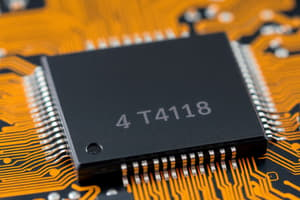Podcast
Questions and Answers
What is the main advantage of using pipelining in ADC architectures?
What is the main advantage of using pipelining in ADC architectures?
- It reduces interleaving requirements. (correct)
- It increases the resolution of signals.
- It decreases power consumption significantly.
- It simplifies the conversion process.
How does a bandpass T-R ADC achieve high-precision data conversion?
How does a bandpass T-R ADC achieve high-precision data conversion?
- Through noise shaping and oversampling. (correct)
- By increasing the bandwidth of the signal.
- By employing a purely digital quantization process.
- By utilizing low-resolution signals exclusively.
What component is used to replace the integrator in a bandpass T-R ADC?
What component is used to replace the integrator in a bandpass T-R ADC?
- A resonator or bandpass filter. (correct)
- A digital quantizer.
- An active low-pass filter.
- A feedback DAC.
What does the 'NTF' referenced in T-R ADCs stand for?
What does the 'NTF' referenced in T-R ADCs stand for?
What kind of circuit can a resonator or bandpass filter be realized as in a T-R ADC?
What kind of circuit can a resonator or bandpass filter be realized as in a T-R ADC?
What key feature does combining interleaving and pipelining in ADC design provide?
What key feature does combining interleaving and pipelining in ADC design provide?
Which stage's output does the sub-ADC convert for further processing?
Which stage's output does the sub-ADC convert for further processing?
What is a characteristic of the data conversion in a T-R ADC?
What is a characteristic of the data conversion in a T-R ADC?
What is the role of RF-DAC in mixed-signal TX systems?
What is the role of RF-DAC in mixed-signal TX systems?
Which of the following correctly describes the efficiency of switching amplifiers in modern wireless communications?
Which of the following correctly describes the efficiency of switching amplifiers in modern wireless communications?
What challenge must be addressed when utilizing switching amplifiers in wireless communications?
What challenge must be addressed when utilizing switching amplifiers in wireless communications?
How do current-mode and voltage-mode RF-DACs differ?
How do current-mode and voltage-mode RF-DACs differ?
What is one significant benefit of unary scaled RF-DACs?
What is one significant benefit of unary scaled RF-DACs?
What is the primary function of an output stage in an RF-DAC?
What is the primary function of an output stage in an RF-DAC?
What types of scaling methods are mentioned in relation to RF-DACs?
What types of scaling methods are mentioned in relation to RF-DACs?
Which modulation type poses challenges for switching amplifiers that operate in RF communications?
Which modulation type poses challenges for switching amplifiers that operate in RF communications?
What is the primary advantage of polar modulators in terms of their output voltage?
What is the primary advantage of polar modulators in terms of their output voltage?
In multiphase RF-DACs, which signals are primarily used to control the individual slices?
In multiphase RF-DACs, which signals are primarily used to control the individual slices?
What is the significance of the absence of CORDIC in the operation of polar RF-DACs?
What is the significance of the absence of CORDIC in the operation of polar RF-DACs?
What does the I and Q signal combination in RF-DACs primarily achieve?
What does the I and Q signal combination in RF-DACs primarily achieve?
What is indicated by the clock phase in multiphase RF-DACs?
What is indicated by the clock phase in multiphase RF-DACs?
How does a polar modulator influence the power efficiency of the system?
How does a polar modulator influence the power efficiency of the system?
What type of RF-DACs is frequently associated with Cartesian principles according to the content?
What type of RF-DACs is frequently associated with Cartesian principles according to the content?
What component is essential for phase control in the output stage of an RF-DAC?
What component is essential for phase control in the output stage of an RF-DAC?
What is a key advantage of using polar RXs over Cartesian RXs in terms of power consumption?
What is a key advantage of using polar RXs over Cartesian RXs in terms of power consumption?
How do polar systems handle quantization compared to Cartesian systems?
How do polar systems handle quantization compared to Cartesian systems?
What is a specific complexity that must be managed in coherent detection for RXs?
What is a specific complexity that must be managed in coherent detection for RXs?
What architectural change has been made possible by continued scaling of CMOS processes?
What architectural change has been made possible by continued scaling of CMOS processes?
What impacts the resolution requirements in polar RXs compared to Cartesian RXs?
What impacts the resolution requirements in polar RXs compared to Cartesian RXs?
What is a consequence of synchronization in coherent detection for RXs?
What is a consequence of synchronization in coherent detection for RXs?
What is the primary benefit of using injection locking in polar RXs?
What is the primary benefit of using injection locking in polar RXs?
Which statement best describes the operation of polar systems regarding signal processing?
Which statement best describes the operation of polar systems regarding signal processing?
What is the primary function of the polar demodulator in the RF-sampling polar RX system?
What is the primary function of the polar demodulator in the RF-sampling polar RX system?
In the given block diagram, what role does the ADC play?
In the given block diagram, what role does the ADC play?
What does the TDC component in the system primarily measure?
What does the TDC component in the system primarily measure?
What is the significance of the synthesizer in the RF-sampling polar RX?
What is the significance of the synthesizer in the RF-sampling polar RX?
What type of signals are primarily involved in the operation of the mixed-signal transceivers?
What type of signals are primarily involved in the operation of the mixed-signal transceivers?
Which component is responsible for applying a delay to the signal within the RF-sampling polar RX system?
Which component is responsible for applying a delay to the signal within the RF-sampling polar RX system?
In the context of the block diagram provided, what is indicated by 'φ'?
In the context of the block diagram provided, what is indicated by 'φ'?
How do mixed-signal transceivers enhance future hybrid systems?
How do mixed-signal transceivers enhance future hybrid systems?
What is the significance of wider band operation in future communication systems?
What is the significance of wider band operation in future communication systems?
Which technology is mentioned as vital for achieving higher band operation in transceivers?
Which technology is mentioned as vital for achieving higher band operation in transceivers?
What does the term 'ΣΔ ADC' refer to in the context of mixed-signal transceivers?
What does the term 'ΣΔ ADC' refer to in the context of mixed-signal transceivers?
Which fabrication process is mentioned for the fully-integrated QPLL-timed direct-RF sampling?
Which fabrication process is mentioned for the fully-integrated QPLL-timed direct-RF sampling?
What role do mixed-signal transceivers play in modern communication systems?
What role do mixed-signal transceivers play in modern communication systems?
In which year was the article regarding mixed-signal transceivers published in 'IEEE J. Solid-State Circuits'?
In which year was the article regarding mixed-signal transceivers published in 'IEEE J. Solid-State Circuits'?
What does the abbreviation 'MIMO' stand for in the context of communications technology?
What does the abbreviation 'MIMO' stand for in the context of communications technology?
What is a common application of the switched-capacitor RFDAC technology?
What is a common application of the switched-capacitor RFDAC technology?
Flashcards
Mixed-signal RF transceiver
Mixed-signal RF transceiver
A transceiver that combines analog and digital circuits to handle radio frequency signals.
RF-DAC
RF-DAC
A mixed-signal device that converts digital baseband signals to analog RF/mm-wave frequencies.
RF-DAC function (3 steps)
RF-DAC function (3 steps)
- Data converter: Converts digital signals to analog; 2) Mixer: Upconverts to RF/mm-wave frequency; 3) Output stage: Drives a power amplifier or antenna.
Switching Amplifier
Switching Amplifier
Signup and view all the flashcards
Power Amplifier (PA) limitation
Power Amplifier (PA) limitation
Signup and view all the flashcards
Output Matching
Output Matching
Signup and view all the flashcards
Linearization
Linearization
Signup and view all the flashcards
Non-constant envelope modulation
Non-constant envelope modulation
Signup and view all the flashcards
Pipelined ADC
Pipelined ADC
Signup and view all the flashcards
Oversampling
Oversampling
Signup and view all the flashcards
Bandpass T-R ADC
Bandpass T-R ADC
Signup and view all the flashcards
Noise shaping
Noise shaping
Signup and view all the flashcards
Interleaving
Interleaving
Signup and view all the flashcards
Effective Sampling Rate
Effective Sampling Rate
Signup and view all the flashcards
Sub-ADC
Sub-ADC
Signup and view all the flashcards
Polar Modulators
Polar Modulators
Signup and view all the flashcards
Polar RF-DAC
Polar RF-DAC
Signup and view all the flashcards
Cartesian RF-DAC
Cartesian RF-DAC
Signup and view all the flashcards
I(t) and Q(t)
I(t) and Q(t)
Signup and view all the flashcards
Vector recombination
Vector recombination
Signup and view all the flashcards
CORDIC
CORDIC
Signup and view all the flashcards
Power Efficiency
Power Efficiency
Signup and view all the flashcards
Polar RXs
Polar RXs
Signup and view all the flashcards
Cartesian RXs
Cartesian RXs
Signup and view all the flashcards
Coherent detection
Coherent detection
Signup and view all the flashcards
Power consumption
Power consumption
Signup and view all the flashcards
Injection locking
Injection locking
Signup and view all the flashcards
Quantization steps
Quantization steps
Signup and view all the flashcards
Mixed-signal transceivers
Mixed-signal transceivers
Signup and view all the flashcards
Resolution requirements
Resolution requirements
Signup and view all the flashcards
RF-sampling polar RX
RF-sampling polar RX
Signup and view all the flashcards
ADC
ADC
Signup and view all the flashcards
TDC
TDC
Signup and view all the flashcards
Delay
Delay
Signup and view all the flashcards
Synthesizer
Synthesizer
Signup and view all the flashcards
Block diagram
Block diagram
Signup and view all the flashcards
Delta-Sigma Data Converters
Delta-Sigma Data Converters
Signup and view all the flashcards
60-GHz transceiver
60-GHz transceiver
Signup and view all the flashcards
Bandpass ΣΔ ADC
Bandpass ΣΔ ADC
Signup and view all the flashcards
QPLL-timed direct-RF-sampling
QPLL-timed direct-RF-sampling
Signup and view all the flashcards
MM-wave switched-capacitor RFDAC
MM-wave switched-capacitor RFDAC
Signup and view all the flashcards
28-nm CMOS
28-nm CMOS
Signup and view all the flashcards
0.13 μm CMOS
0.13 μm CMOS
Signup and view all the flashcards
Study Notes
Mixed-Mode Transceivers
- This tutorial introduces mixed-signal RF transceivers, focusing on their motivations and concepts.
- Transmitter (TX) and receiver (RX) circuits, and different architectures, are discussed.
- CMOS transistor scaling following Moore's Law, has driven increased transistor counts from approximately 2,000 in 1971 to 50 billion in 2021.
- This scaling has led to faster, lower resistance switches but reduced intrinsic gain.
Scaling of CMOS Devices
- CMOS transistor scaling over the past 50 years has been driven by the desire to increase transistor count on a single die, as per Moore's Law.
- The number of transistors on microprocessors increased from approximately 2,000 in 1971 to around 50 billion in 2021.
- This scaling has generally led to faster and lower resistance MOS devices, but with reduced intrinsic gain.
- These factors necessitate architectural changes in deeply scaled CMOS that leverage CMOS strengths.
Conventional TX and RX Chains
- Conventional transmitter (TX) and receiver (RX) chains rely heavily on analog components.
- Analog components like filters and amplifiers are often used.
- Transistor action as a voltage-dependent current source with high transconductance (gm) and output resistance (ra) is important.
- Impedance matching between circuit blocks is crucial to maintain bandwidth, but is complex with many blocks.
Mixed-Signal TXs
- Mixed-signal transmitters (TXs) combine data conversion, mixing, and power amplification in single blocks.
- Modern wireless systems use wider bandwidths and much more linear modulation formats such as OFDM, 4096-QAM, and so on.
- This leads to mixed signals needing to be operated with high linearity.
- Mixed-signal transmitters use digital logic gates and high impedance switches in place of traditional analog blocks (amplifiers, mixers) in conventional designs.
- Impedance matching is needed just between the output stage and the antenna
RF-DACs
- RF-DACs are a primary type of mixed-signal TX.
- They convert baseband digital signals into analog signals at RF using data converters and mixers functions.
- Output stages often use a power amplifier (PA) to drive RF power to the antenna.
- RF-DACs can operate in current-mode (arrays of switchable current sources) or voltage-mode (arrays of switchable capacitors).
Current-Mode RF-DACs
- Current-mode RF-DACs use a bank of parallel current cells.
- Individual cells can be controlled to turn on and off.
- Operation as linear amplifiers (class B), or switching amplifiers (class D⁻¹), can yield high efficiency.
- Output power can be adjusted by adjusting which cells are "on".
Voltage-Mode RF-DACs
- Voltage-mode RF-DACs use switched capacitor power amplification (SCPA) topology.
- Class D power amplifier outputs result as a squared wave, into a resonant tank, which yields higher power efficiencies.
- Similar to class D1 power amplifiers, but voltage outputs are driven by the appropriate digital components.
- Output voltage is linear with respect to the digital output code, unlike current-mode RF-DACs.
Polar Versus Cartesian RF-DACs
- Polar RF-DACs handle amplitude and phase modulation (AM and PM) in the polar domain.
- Cartesian RF-DACs (or Multiphase RF DACs) work directly with in-phase (I) and quadrature (Q) components in Cartesian or Multiphase domains.
- Cartesian architectures have benefits such as simplified clocking and no need for CORDIC for vector conversion, while polar architectures can offer higher power efficiency.
- Polar architecture is more complex due to increased bandwidth operation caused by non-linear mathematical calculations.
RF-sampling Polar RXs
- Polar RF receivers utilize injection locking of the local oscillator to the incoming signal to improve power efficiency.
- Polar receivers improve on Cartesian counterparts by potentially allowing for larger steps in quantization.
- Polar receiver and transmitter designs may be easier because the polar coordinate representation reduces the need for filtering on the receiver side, resulting in more simplified architecture.
Mixed-Signal RF Design Considerations
- Mixed-signal designs allow for flexible, wideband, direct-to-digital conversion, which are key aspects for next-generation wireless communications systems.
- Embedded frequency multipliers are a key component in mm-wave operations.
- Future work includes improving multi-band operation, reducing out-of-band noise, and improving spectral purity.
Studying That Suits You
Use AI to generate personalized quizzes and flashcards to suit your learning preferences.




